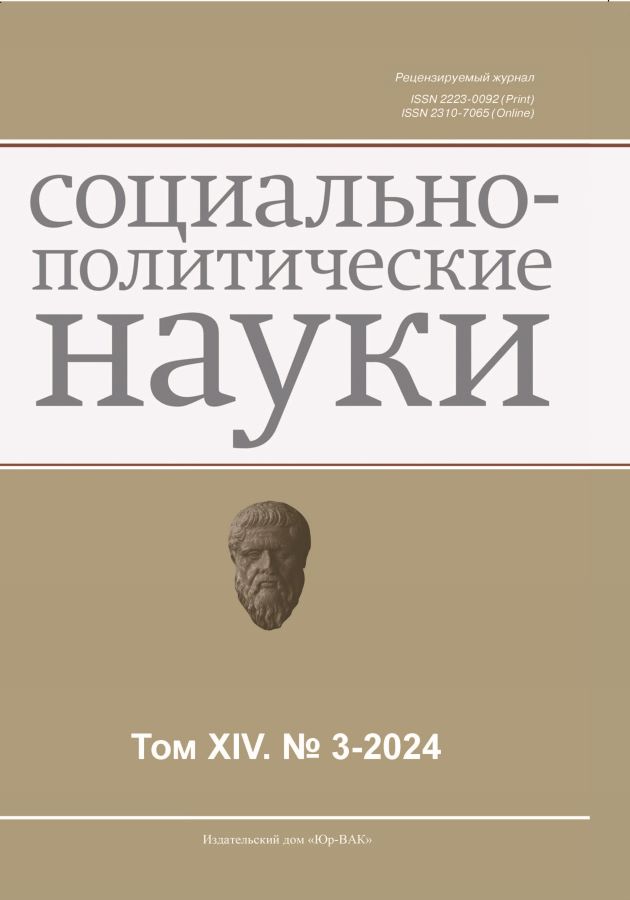Legal-communicative competence in modern domestic and foreign scientific research
- Authors: Usmanova E.F.1, Khudoykina T.V.1, Adaeva O.V.1
-
Affiliations:
- Ogarev Mordovian State University
- Issue: Vol 14, No 3 (2024)
- Pages: 59-64
- Section: Russian Public Administration: Pages of History and Modernity
- URL: https://journals.eco-vector.com/2223-0092/article/view/635468
- DOI: https://doi.org/10.33693/2223-0092-2024-14-3-59-64
- EDN: https://elibrary.ru/IPLQHP
- ID: 635468
Cite item
Abstract
The purpose of the study. Within the framework of the study the task was set to study and analyze domestic and foreign scientific research devoted to the communicative competence of a lawyer in order to identify the features and elements of this category, as well as to determine the ways of its formation and development.
The conclusions of the study. In general, under the legal-communicative competence most researchers understand a systemic education characterized by the presence of communicative knowledge, skills and abilities necessary in legal practice. Сommunicative competence includes the following knowledge, skills and abilities: deep knowledge of the legal profession and mastery of the terminology of the professional sphere; ability to perceive, analyze and use legal information in relation to a particular situation; knowledge of the rules of etiquette and the ability to use them in professional communication; mastery of speech, which covers professional legal concepts and categories, containing speech and communication skills. It is noted that modern means of formation of communicative competence should be focused on all structural elements, as their interrelation with communicative experience is a personal-communicative education contributing to the achievement of social demands.
Full Text
About the authors
Elena F. Usmanova
Ogarev Mordovian State University
Author for correspondence.
Email: usmanowa_ef@rambler.ru
ORCID iD: 0000-0003-3723-3804
Cand. Sci. (Law), Associate Professor; Head, Department of State and Administrative Law
Russian Federation, SaranskTatyana V. Khudoykina
Ogarev Mordovian State University
Email: thudoykina@mail.ru
ORCID iD: 0000-0001-9876-1438
Dr. Sci. (Law), Professor; Head, Department of Legal Technologies and Jurisprudence
Russian Federation, SaranskOlga V. Adaeva
Ogarev Mordovian State University
Email: adaeva.mgu@mail.ru
ORCID iD: 0000-0001-8336-2549
senior lecturer, Department of Legal Technologies and Jurisprudence
Russian Federation, SaranskReferences
- Anisimova T.V. The role of legal rhetoric in the process of formation of communicative competence of a future lawyer. Philological Aspect: International Scientific and Practical Journal. Series: Methodology of Teaching Language and Literature. 2023. No. 04 (21). (In Rus.) URL: https://scipress.ru/fam/articles/rol-yuridicheskoj-ritoriki-v-protsesse-formirovaniya-kommunikativnoj-kompetentsii-budushhego-yurista.html
- Dvornikova D.O. Necessity of formation of communicative competence of law students // Actual problems of health saving in modern society: Collection of scientific articles of the IVth All-Russian scientific-practical conference. Kursk: South-West State University, 2022. Pp. 73–76.
- Mikhailova T.N., Kiseleva I.N. Organisation of research work as a factor in the formation of communicative competence of the student. Business. Education. Law. 2021. No. 2 (55). Pp. 368–373. (In Rus.)
- Pashentseva K.D., Anufrieva D.A. Communicative competence of police officers as a factor of their success in professional activity. Psychology and Pedagogy of Service Activity. 2022. No. 4. Pp. 259–262. (In Rus.)
- Pritsker E., Kapustina V. Communicative competence of employees of compulsory execution bodies and peculiarities of its formation. Russian Journal of Education and Psychology. 2022. No. 13 (4). Pp. 44–57. (In Rus.)
- Soldatova G.V. The concept of communicative competence and communicative deficits in Russian psychology. Methodology of Modern Psychology. 2021. No. 13. Pp. 380–388. (In Rus.)
- Stulba S.A. Communicative competence in the professional activity of employees of internal affairs bodies. Bulletin of the Academy of the Ministry of Internal Affairs of the Republic of Belarus. 2023. No. 2 (46). Pp. 202–206. (In Rus.)
- Sukhorukova O.A. Communicative competence of the judge and other participants of the process as a condition of effective legal proceedings. Vestnik of Voronezh State University. Series: Law. 2022. No. 1 (48). Pp. 329–336. (In Rus.)
- Tontoyeva T. V. Diagnostics of the level of development of communicative competence of future lawyers. In: Research and teaching of languages: Analysis, experience, technologies: Collection of scientific articles. Ulan-Ude: Buryat State University, 2022. Pp. 125–135.
- Adila M.F. The ways of motivation of effectiveness of verbal and non-verbal communication. International Journal of Innovative Technologies in Social Science. 2022. Vol. 4 (36). Pp. 1–6.
- Gorlova L. Components of professional and communicative competence of future lawyers. InterConf, 2023. Рp. 315–322.
- Gorlova L. Formation of professional-communicative competence of future lawyers in the process of professional training. The sources of Pedagogical Skills. 2021. No. 3. Pp. 32–36.
- Hymes D.H. On communicative competence. In: Sociolinguistics. J.B. Pride, J. Holmes (eds.). Selected Readings. Harmondsworth: Penguin, 1972. Pp. 269–293. URL: https://wwwhomes.uni-bielefeld.de/sgramley/Hymes-2.pdf
- Jurik V., Gröschner A., Seidel T. Predicting students’ cognitive learning activity and intrinsic learning motivation: How powerful are teacher statements, student profiles, and gender? Learning and Individual Differences. 2014. Vol. 32. Pp. 132–139.
- Kiessling C., Fabry G. What is communicative competence and how can it be acquired? GMS Journal for Medical Education. 2021. No. 38.
- Rubin R.B., Palmgreen P., Sypher H.E. Communication research measures. NY: Routledge, 2020. 416 р.
- Spitzberg B. Communication competence: Measures of perceived effectiveness. In: Tardy Ch.H. A handbook for the study of human communication: Methods and instruments for observing, measuring, and assessing communication processes. NY, 2018.
- Vaganova O., Tsyganova, L., Chelnokova, E. et al. Technology “debate” as a tool for communicative competence development. Revista Amazonia Investiga. 2020. Vol. 9. Pp. 367–375.
- Vorwerg C. Communicative competence: Linguistic aspects. In: International Encyclopedia of the social & behavioral sciences. 2015. doi: 10.1016/B978-0-08-097086-8.53042-6
- Wiemann J.M., Backlund P. Current theory and research in communicative competence. Review of Educational Research. 1980. No. 50 (1). Pp. 185–199. doi: 10.2307/1170034
- Zhang J. Reconceptualizing communicative competence based on pragmatic rationality. 2023. doi: 10.13140/RG.2.2.25014.68163
Supplementary files









